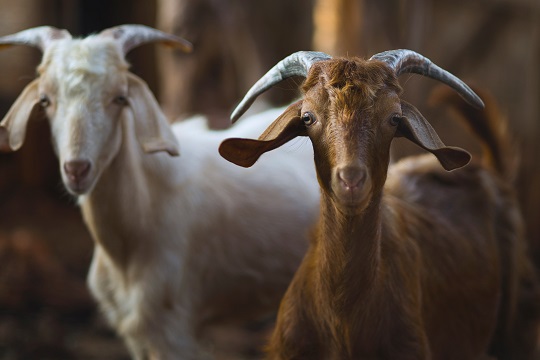12 January 2022
As we collectively look for more sustainable and circular ways of using our natural resources, new business ideas emerge reports the Guardian. Jack Millington made a career change to help prevent thousands of male goats, known as billies, to be slaughtered at birth and see their hides discarded. His change of trajectory started when he tried to help his father, a dairy farmer, to find a market for his goat meat. He discovered that masses of goatskins that were being discarded, which is a terrible waste. Report by One 4 Leather.

Billy Goat
The UK’s commercial goat-milking herd consists of around 50.000 animals. While there has been much controversy around the killing of male calves, as they are unwanted for dairy production, billy goats have been largely overlooked. The Goat Veterinary Society estimates around 3.000 billy goat kids are slaughtered every year. Meat distributors like Cabrito in the UK make it interesting for farmers to rear billies for up to 7 months before slaughter, but for the goatskins, there was no real destination available as they are considered a biohazard by abattoirs and thus incinerated.
Jack Millington worked with the University of Northampton, well known for its leather programs, to develop a tanning recipe with natural bark extracts and opened up his own micro-tannery. The vegetable tanning process takes up to two weeks, starting with raw hides, covering them in salt to preserve the skin before heading to the traditional “beamhouse operation”. The hides are soft to touch, but the beauty is in the details. Once tanned, the skins are finished at a local leather goods producer and handcrafted into luxury bags, wallets and made-to-order shoes.
Curious how leather is made? Find out more here.
The Billy Tannery has been up and running for three years now and sources its hides from the meat distributor Cabrito. And this is a good thing. The meat and dairy industry, leather and our consumption are closely linked. Making the most of all parts, including the by-products, in this cycle is the right thing to do.
Read the entire article on the circular tannery.
We bring leather, material and fashion businesses together: an opportunity to meet and greet face to face. We bring them from all parts of the world so that they can find fresh partners, discover new customers or suppliers and keep ahead of industry developments.
We organise a number of trade exhibitions which focus on fashion and lifestyle: sectors that are constantly in flux, so visitors and exhibitors alike need to be constantly aware both of the changes around them and those forecast for coming seasons.